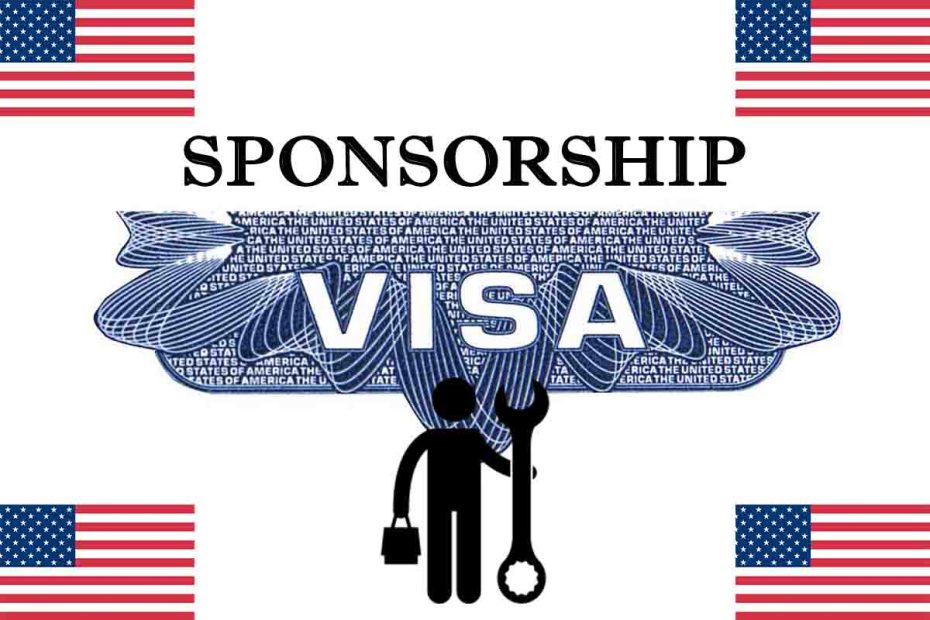Visa sponsorship is a process where a company or individual takes responsibility for a foreign worker’s legal status in a host country. The sponsor usually applies with the government and assumes financial and legal responsibility for the foreign worker.
Visa sponsorship is critical for foreign workers as it allows them to legally work and live in a foreign country. Without a sponsor, it can be challenging to navigate the immigration process and obtain the necessary legal documents, which can impact their ability to secure employment and stay in the country legally.
The purpose of this blog post is to provide an overview of the different types of visa sponsorships available for foreign workers, the benefits and limitations of each, and how to navigate the application process. By understanding the options available and the application requirements, foreign workers can make informed decisions about their career and immigration goals.
Temporary Visa Sponsorships
1. H-1B Visa:
Eligibility Requirements:
- The foreign worker must have a job offer from a U.S. employer in a speciality occupation that requires a bachelor’s degree or equivalent.
- The foreign worker must possess a bachelor’s degree or higher degree, or its equivalent, in the specific speciality for which they are being hired.
- The employer must pay the foreign worker the prevailing wage for that occupation.
Application Process:
- The employer files a Labor Condition Application (LCA) with the U.S. Department of Labor.
- The employer files Form I-129, Petition for Nonimmigrant Worker, with the U.S. Citizenship and Immigration Services (USCIS).
- The foreign worker applies for an H-1B visa at a U.S. embassy or consulate abroad.
Duration and Limitations:
- The initial duration of an H-1B visa is up to three years, with the option to extend up to a total of six years.
- The H-1B visa holder must work for the sponsoring employer and cannot change employers without obtaining a new H-1B visa.
- There is an annual cap on the number of H-1B visas available, and the demand often exceeds the supply.
2. L-1 Visa:
Eligibility Requirements:
- The foreign worker must be employed by a company outside the U.S. that has a qualifying relationship with a U.S. company, such as a parent, subsidiary, or affiliate.
- The foreign worker must have worked for the qualifying company for at least one year in the past three years in an executive, managerial, or specialized knowledge capacity.
Application Process:
- The U.S. employer files Form I-129, Petition for Nonimmigrant Worker, with the USCIS.
- The foreign worker applies for an L-1 visa at a U.S. embassy or consulate abroad.
Duration and Limitations:
- The initial duration of an L-1 visa is up to three years for a new office or up to one year for an existing office.
- The L-1 visa holder may be eligible to extend their stay up to a total of seven years.
- The L-1 visa holder must work for the sponsoring employer and cannot change employers without obtaining a new visa.
3. E-3 Visa:
Eligibility Requirements:
- The foreign worker must have a job offer from a U.S. employer in a speciality occupation that requires a bachelor’s degree or equivalent.
- The foreign worker must possess a bachelor’s degree or higher degree, or its equivalent, in the specific speciality for which they are being hired.
- The foreign worker must be a citizen of Australia.
Application Process:
- The employer files a Labor Condition Application (LCA) with the U.S. Department of Labor.
- The employer files Form I-129, Petition for Nonimmigrant Worker, with the USCIS.
- The foreign worker applies for an E-3 visa at a U.S. embassy or consulate abroad.
Duration and Limitations:
- The initial duration of an E-3 visa is up to two years, with the option to extend up to a total of four years.
- The E-3 visa holder must work for the sponsoring employer and cannot change employers without obtaining a new visa.
- There is an annual cap on the number of E-3 visas available, but it has not been reached in recent years.
Permanent Visa Sponsorships
Employment-based immigrant visas:
EB-1 Visa:
- Eligibility requirements: The foreign worker must be an individual with extraordinary ability in the sciences, arts, education, business, or athletics; an outstanding professor or researcher; or a multinational executive or manager.
- Application process: The employer files Form I-140, Immigrant Petition for Alien Worker, with the USCIS.
- Duration and limitations: The EB-1 visa does not have a cap, and the processing time is usually shorter than other employment-based visas. The EB-1 visa holder can obtain a green card immediately upon arrival in the U.S.
EB-2 Visa:
- Eligibility requirements: The foreign worker must have an advanced degree or exceptional ability in the sciences, arts, or business that is in the national interest.
- Application process: The employer files Form I-140, Immigrant Petition for Alien Worker, with the USCIS.
- Duration and limitations: The EB-2 visa has a cap, and the processing time can take several years. The EB-2 visa holder can obtain a green card immediately upon arrival in the U.S.
EB-3 Visa:
- Eligibility requirements: The foreign worker must have a bachelor’s degree or equivalent or two years of experience in a skilled trade.
- Application process: The employer files Form I-140, Immigrant Petition for Alien Worker, with the USCIS.
- Duration and limitations: The EB-3 visa has a cap, and the processing time can take several years. The EB-3 visa holder can obtain a green card immediately upon arrival in the U.S.
EB-4 Visa:
- Eligibility requirements: The foreign worker must be a special immigrant, such as a religious worker, broadcaster, or Iraqi or Afghan translator.
- Application process: The employer files Form I-360, Petition for Amerasian, Widow(er), or Special Immigrant, with the USCIS.
- Duration and limitations: The EB-4 visa does not have a cap, and the processing time is usually shorter than other employment-based visas. The EB-4 visa holder can obtain a green card immediately upon arrival in the U.S.
EB-5 Visa:
- Eligibility requirements: The foreign worker must invest at least $1 million, or $500,000 in a targeted employment area, in a new commercial enterprise that creates at least 10 full-time jobs for U.S. workers.
- Application process: The foreign worker files Form I-526, Immigrant Petition by Alien Entrepreneur, with the USCIS.
- Duration and limitations: The EB-5 visa has a cap, and the processing time can take several years. The EB-5 visa holder can obtain a green card immediately upon arrival in the U.S.
Family-based immigrant visas:
Would You Like To Apply For This Jobs/Sponsorship?
Enter Your Email Address HERE & You Will Receive a Notification About Your Application. If it shows "Subscribed" CLICK HERE to follow on Telegram for updatesSpouse or fiancé(e) visa:
- Eligibility requirements: The foreign worker must be married to a U.S. citizen or have a fiancé(e) who is a U.S. citizen.
- Application process: The U.S. citizen files Form I-130, Petition for Alien Relative, with the USCIS.
- Duration and limitations: The spouse or fiancé(e) visa does not have a cap, and the processing time can take several months to a year. The spouse or fiancé(e) can obtain a green card immediately upon arrival in the U.S.
Parent, sibling, or child visa:
- Eligibility requirements: The foreign worker must be a parent, sibling, or child of a U.S. citizen or permanent resident.
- Application process: The U.S. citizen or permanent resident files Form I-130, Petition for Alien Relative, with the USCIS
Factors to Consider
Job type:
The type of job that a foreign worker is seeking in the U.S. can have an impact on the type of visa sponsorship that is available. For example, highly skilled workers may be eligible for an H-1B visa, while those in skilled trades may be eligible for an EB-3 visa.
Education and experience:
The education and experience of the foreign worker can also be a determining factor in the type of visa sponsorship that is available. For example, a worker with a bachelor’s degree or equivalent may be eligible for an EB-3 visa, while a worker with an advanced degree or exceptional ability may be eligible for an EB-2 visa.
Employer sponsorship:
In many cases, an employer must sponsor a foreign worker for a visa for them to work in the U.S. Employers must demonstrate that they are unable to find qualified U.S. workers to fill the position before sponsoring a foreign worker.
Immigration policies:
Immigration policies can have an impact on the availability of visa sponsorships for foreign workers. For example, changes in visa quotas or restrictions on certain types of visas can limit the options available to foreign workers seeking sponsorship in the U.S. foreign workers and employers need to stay up-to-date on changes in immigration policies that could impact their ability to obtain a visa sponsorship.
Conclusion
In summary, there are various types of visa sponsorships available for foreign workers who wish to work in the United States. These visa sponsorships include temporary visa options such as the H-1B, L-1, and E-3 visas, as well as permanent visa options such as employment-based and family-based immigrant visas.
It is important for foreign workers and their employers to understand the different visa sponsorship options available to them, and to carefully consider factors such as job type, education and experience, employer sponsorship, and immigration policies when deciding which option is the best fit.
By understanding these factors and their options, foreign workers and employers can navigate the visa sponsorship process with greater confidence and increase their chances of success.
In conclusion, if you are a foreign worker seeking employment in the United States, it is crucial to do your research and understand the visa sponsorship options available to you. Seek the guidance of an experienced immigration attorney who can help you navigate the process and increase your chances of success.







I would love to get this opportunity and she work with my skills in u.s. so please guide me to get the working permit thank you
I am looking for any job abroad and I have many skills